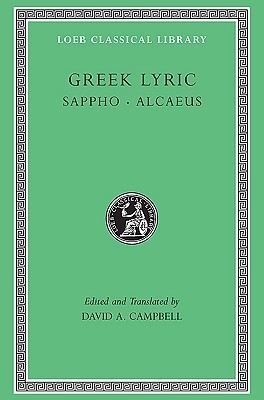What do you think?
Rate this book


This volume contains the poetic fragments of the two illustrious singers of early sixth-century Lesbos: Sappho, the most famous woman poet of antiquity, whose main theme was love; and Alcaeus, poet of wine, war, and politics, and composer of short hymns to the gods. Also included are the principal testimonia, the ancients' reports on the lives and work of the two poets.
The five volumes in the Loeb Classical Library edition of Greek Lyric contain the surviving fragments of solo and choral song. This poetry was not preserved in medieval manuscripts, and few complete poems remain. Later writers quoted from the poets, but only so much as suited their needs; these quotations are supplemented by papyrus texts found in Egypt, most of them badly damaged. The high quality of what remains makes us realise the enormity of our loss.
Volume I presents Sappho and Alcaeus. Volume II contains the work of Anacreon, composer of solo song; the Anacreontea; and the earliest writers of choral poetry, notably the seventh-century Spartans Alcman and Terpander. Stesichorus, Ibycus, Simonides, and other sixth-century poets are in Volume III. Bacchylides and other fifth-century poets are in Volume IV along with Corinna (although some argue that she belongs to the third century). Volume V contains the new school of poets active from the mid-fifth to the mid-fourth century and also collects folk songs, drinking songs, hymns, and other anonymous pieces.
512 pages, Hardcover
First published January 1, 551
171
paingiver
164
she summons her son
μήτε μοι μέλι μήτε μέλισσα
(mēte moi meli mēte melissa)
]
here to me from Krete to this holy temple
where is your graceful grove
of apple trees and altars smoking
with frankincense.
And it in cold water makes a clear sound through
apple branches and with roses the whole place
is shadowed and down from radiant-shaking leaves
sleep comes dropping.
Leave Crete and sweep to this blest temple
Where apple-orchard's elegance
Is yours, and smouldering altars, ample
Frankincense.
Here under boughs a bracing spring
Percolates, roses without number
Umber the earth and, rustling,
The leaves drip slumber.
You came, and I was longing for you; you cooled my heart which was burning with desire. —Sappho, 48
I fell by the hands of Cyprian Aphrodite . . . —Alcaeus, 380
The golden-shining attendant of Aphrodite . . . —Sappho or Alcaeus, 23
__________
Learn the story of Admetus, my friend: love the good and keep away from the worthless. —Sappho or Alcaeus, 25C
I wish . . . —Sappho, 22